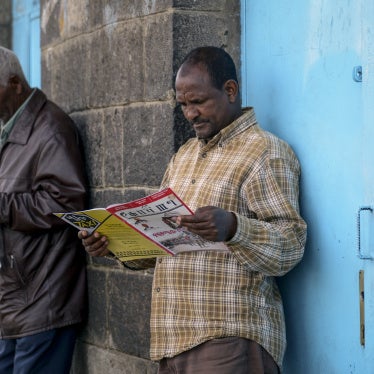(Dakar) – Guinea’s political parties should act with restraint and take concrete steps to prevent election-related violence. The security forces should intervene to prevent violence in a lawful and impartial manner.
The presidential elections took place on October 11, 2015, amid heightened ethnic and political tensions. Some opposition leaders, in anticipation of unfavorable results, have said they will protest alleged electoral fraud. Deadly clashes between pro-government and opposition supporters, sometimes involving the security forces, punctuated the months before the elections.
“Political and ethnic tensions in Guinea have been rising steadily and risk reaching a truly precarious level,” said Corinne Dufka, West Africa director at Human Rights Watch. “The political parties need to ensure restraint by their members, and Guinean security forces should apply discipline, minimum force, and neutrality at all times when responding to post-election violence.”
At least three people were killed and scores wounded country-wide in the two weeks before the polls. Incidents of violence have continued following the elections, with police using teargas and other means to disperse opposition supporters who had burned tires, erected barricades, or thrown stones. Several people have been admitted to hospitals with gunshot wounds. Electoral violence in April and May left at least three dead and more than 200 injured, including 77 members of the security forces.
Political violence in Guinea is fueled by deep ethnic divisions, with the ruling party, the Rally of the Guinean People Party (Rassemblement du Peuple de Guinée, or RPG), dominated by the ethnic Malinke. Supporters of the largest opposition party, the Union of Democratic Forces of Guinea (Union des Forces Démocratiques de Guinée, or UFDG) are largely drawn from the Peuhl ethnic group.
Political party leaders have said that those involved in street violence are not part of their movement, but the leaders have appeared to take inadequate steps to ensure discipline by their supporters, Human Rights Watch said.
On election day, seven opposition parties, including the UFDG, announced their rejection of the results. UFDG candidate Cellou Dalein Diallo has demanded that “the election be scrapped” and said that the opposition will demonstrate in protest. He cited incidents of voter intimidation, opposition arrests or removal by security forces, ballots marked in advance, and bribes of cash and rice offered to voters at polling places.
During election-related opposition protests in April and May, at least two protesters were killed in the capital, Conakry, and 146 people wounded, many by gunshot. Human Rights Watch found that some members of Guinea’s security forces, particularly the police, demonstrated a partisan response to protests, using ethnic slurs against opposition supporters, and engaged in criminal conduct against real or perceived opposition supporters. Human Rights Watch also documented criminal conduct by some opposition demonstrators, including attacks on people wearing ruling party t-shirts or those believed to support the ruling party, resulting in several injuries.
The United Nations Basic Principles on the Use of Force and Firearms by Law Enforcement Officials instruct law enforcement officials, in carrying out their duties, to use nonviolent means to all extent possible before resorting to force. Whenever the lawful use of force is unavoidable, law enforcement officials must use restraint, minimize damage and injury at all times, and respect and preserve human life.
On October 14, the International Criminal Court issued a statement with respect to the Guinea election, warning that “anyone who commits, orders, incites, encourages or contributes in any other way to the commission of atrocity crimes falling within the jurisdiction of the ICC is liable to prosecution either in Guinea or at the Court in The Hague.”
“Given previous deadly incidents of election-related violence, the concerns are high,” Dufka said. “The government should send a clear message that abuses by the security forces and acts of violence from any party, including the ruling party, will be impartially investigated and prosecuted. Political party leaders should be loudly transmitting this message to their members.”
Guinean political parties should:
- Make clear and strong public statements, at the highest levels of each party, denouncing all forms of politically motivated violence.
- Discipline members found to have engaged in, ordered, covered up, or incited violence, including by expelling them from the party.
- Fully cooperate with any criminal investigation into election-related violence.
- Pursue through the Guinean judicial system abuses committed against party members and investigations of complaints of electoral fraud.
The commander of the National Gendarmerie and director general of the police should:
- Direct all security force members, particularly the police, to abide by the UN Basic Principles on the Use of Force and Firearms by Law Enforcement Officials in policing demonstrations, and provide ongoing training on the use of these Principles.
- Inform all ranks of the security forces that credible allegations of human rights abuses by security forces will be investigated, and those responsible will be disciplined and held to account.









